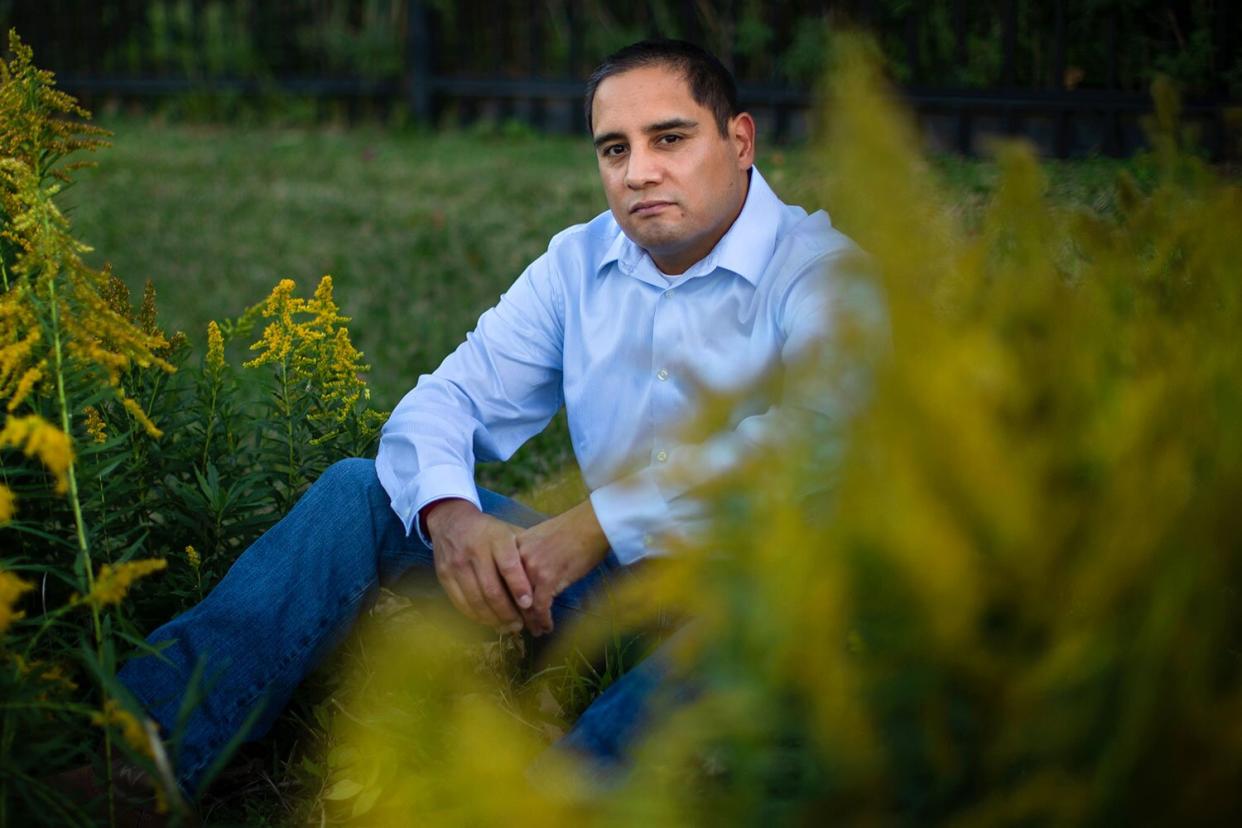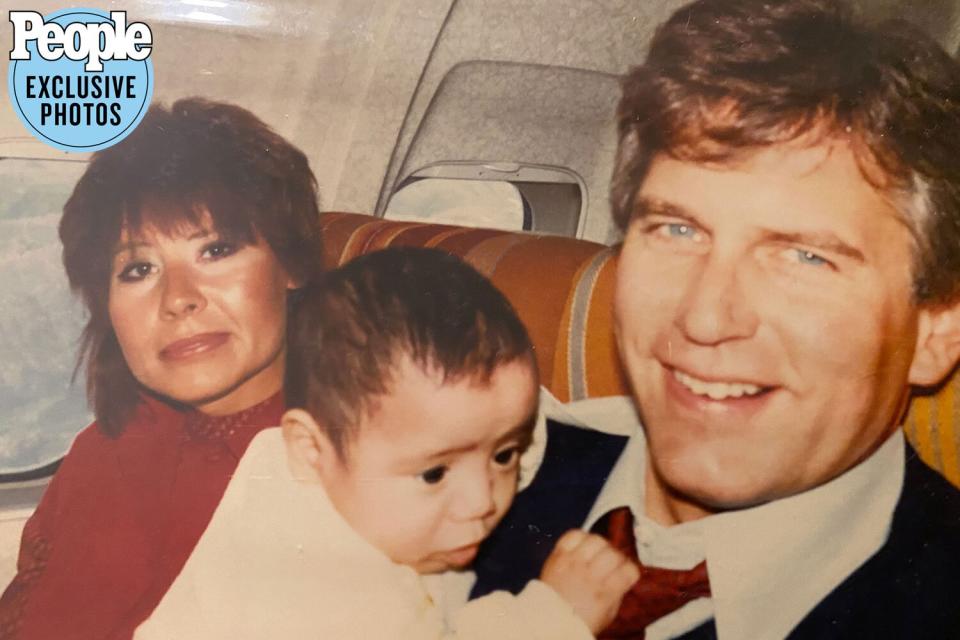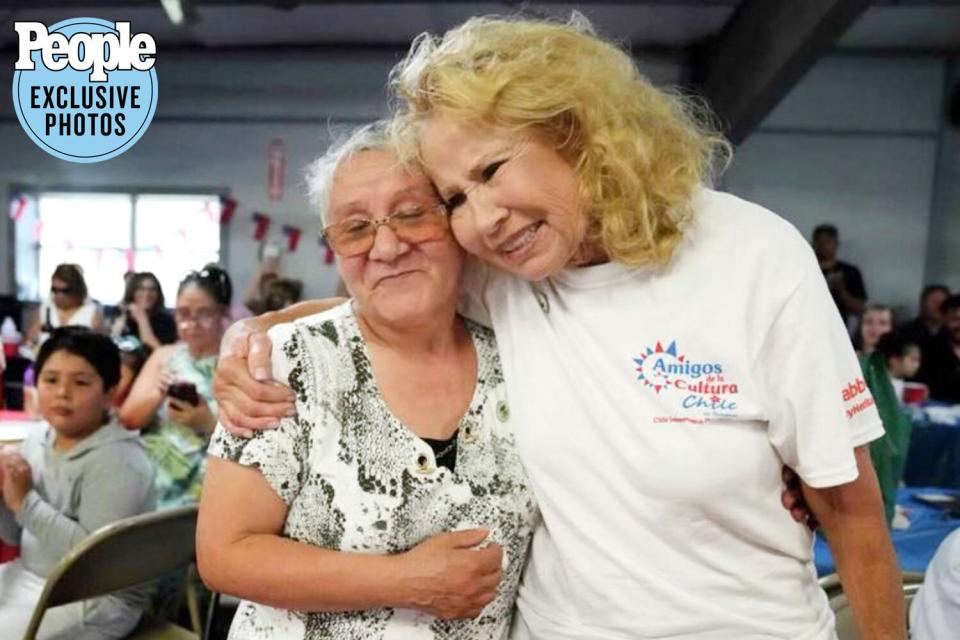Texas Firefighter Who Was Stolen at Birth in Chile Says 'Time Is Running Out' to Reunite Similar Families

Marie De Jesus Tyler Graf in Houston in November
Tyler Graf knew as a child in suburban St. Paul, Minn., that the reason he looked different from his family was because he'd been born in Chile. It took more than three decades to discover the shocking truth of his adoption: he, like thousands of other babies in Chile in the '70s and '80s, had been stolen from his birth parents.
Now Graf, 39, is on a mission to help others Chilean adoptees like him find their biological families through his organization Connecting Roots. "Seeing the happiness that this creates when these two families meet for the first time, to know that there was a lifetime of pain that is now going to be patched, it's incredible," Graf tells PEOPLE in this week's issue, of his work with Connecting Roots.
Growing up in an affluent neighborhood where he "was given every opportunity to succeed," Graf knew his adoptive parents had longed for a baby before they turned to an international adoption agency for help. In 1983, they received the call they were hoping for: A newborn boy in a Chilean orphanage was ready for adoption. After making preparations, the couple set off for the long journey to the city of Temuco in southern Chile, where orphanage officials placed a dark-eyed boy in their arms. "He was adorable—cooing and as good as can be," recalls Carol Graf Carnish, now 76. (Graf's adoptive father died when he was 10.) "It was a dream come true."

Graf with his parents in 1983, flying home to Minnesota from Chile.
RELATED: Father and Daughter Find Each Other After Searching for Decades: 'We Had So Much in Common'
Graf and his adoptive parents always thought his biological mother had agreed to the adoption because she couldn't afford to care for him. And that, Graf says, left him with a sense of loss: "You wonder, 'How can someone just give someone away? Was I not good enough?' That lingers through your life."
The truth was, his birth mother never considered giving him away. Hilda Quezada Godoy remembers staring into her son's dark eyes soon after he was born in a Temuco hospital in March of 1983, before nurses whisked the baby away because he was premature. Hilda was told to go home to recover from her C-section, but when she returned to see her son, hospital workers told her that he had died. She wanted to see his body — to hold him one last time — but staff said he'd already been cremated and she should return home. For nearly a decade, her country had been under the brutal dictatorship of General Augusto Pinochet, so Hilda had learned not to question authority.
For more on Tyler Graf and other adoptees who were stolen at birth, pick up the latest issue of PEOPLE, on newsstands Friday, or subscribe here.
She left the hospital, but every year on March 2, she remembered the birthday of the son she had lost. "I never accepted his death. I always dreamed of my baby," Godoy tells PEOPLE. "I felt angry and asked so many questions, but had no answers."
Graf was one of an estimated 8,000 to 20,000 babies taken from mostly poor mothers in Chile in the '70s and '80s and placed with families in North America, Europe and beyond. The illegal adoption scheme was orchestrated by the Pinochet regime as a means of reducing poverty. When he learned his full story, "it was all the emotions at once," says Tyler. "We were all victims of a terrible time: my biological mother who grieved me; my adoptive mother, who had the purest of intentions and thought she was giving a child a better life; and me in between." It was, says Carol, "an absolute betrayal. We were taken advantage of."
For years, Graf, a firefighter in Houston, wasn't interested in digging into his past, but when he met a group of firefighters from Chile in 2012 who were visiting through a training program organized by a group called Fires Foundation, his curiosity about his birth country grew. One of the Chileans offered to research his biological family and finally, on May 22, 2021, Graf learned they'd been found.
Two days later he was on a Zoom call with one of his biological sisters (a translator helped them since Graf didn't speak Spanish). "I can't believe you are alive!" she said, covering her mouth in shock. "Mom thought you were her angel." Graf, who knew nothing of Chile's dark history or his biological mother's agony, was stunned. "I thought, 'This can't be real. This is like a movie plot,' " he says. When his adoptive mother learned the news, "my first thought was the pain this had caused his birth mom," she says.
Graf had his first call with Hilda on Father's Day 2021: "She has the most soothing voice," he says. "To hear her say she loved me was amazing." A DNA test confirmed the match, and that October, Hilda flew to Texas and held Tyler for the first time since his birth. "We fit together like a perfect puzzle," he says. For Hilda, "knowing my son was alive was the most beautiful news I have ever been given," she says. "I asked him to look at me with his big eyes and it was the same look that I remembered from when he was born."
Since then, Graf, who learned he has three biological sisters, has visited Chile twice and is learning Spanish. In September his two mothers met in Texas: "I see the understanding and love between my moms," says Graf, who is married and has a 2-year-old son. "There's no resentment or hate. It was a rough past, but we can have a beautiful new beginning." When Carol saw Hilda in the airport, "all I could do was hug her."

Tyler Graf’s adoptive mother, Carol Graf Carnish (right) and his biological mother, Hilda Quezada Godoy, met in September. “They were both victims,” says Tyler.
Tyler's mission now is to help other families like his by tracing paperwork from Chilean orphanages and the country's government. Since setting up his nonprofit Connecting Roots a year ago, he has reunited more than 32 adoptees from Chile with their biological families and is in the process of helping nine others. Connecting Roots provides them with free DNA kits through a partnership with MyHeritage and free Spanish lessons from the Babbel app. "These moms are getting older, so time is running out," he says. "If you're a Chilean adoptee and you haven't explored your background, please reach out. These mothers are so thankful to have us back."

Tyler Graf started the non-profit Connecting Roots to help other families reunite.

